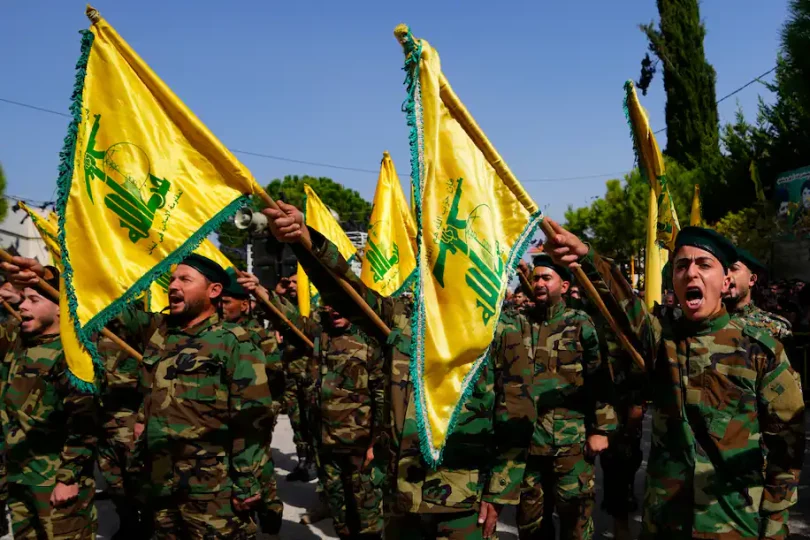The potential for escalation remained particularly high along Israel’s northern border with Lebanon, where the Israeli military continued to evacuate towns on Sunday in the face of “more and more attacks” from Hezbollah, said Lt. Col. Jonathan Conricus, a spokesman for the Israel Defense Forces.

About 100,000 Israelis have been evacuated nationwide, an Israeli government spokesperson said Sunday, and another 100,000 have moved voluntarily.
During a visit to soldiers in northern Israel, Prime Minister Benjamin Netanyahu warned Hezbollah that it would be making “the mistake of its life” if it chose to enter the conflict. “We will cripple it with unimaginable force,” he continued, saying the result would be “devastating” for Lebanon.
Israel has fought two wars with Lebanon over the past four decades — the most recent in 2006 — and tensions have simmered for years with Hezbollah, which the United States and others have designated a terrorist organization. Israeli authorities fear the group has been emboldened by the Oct. 7 Hamas attacks on southern Israel that killed more than 1,400 people.
Antitank missiles were fired from Lebanon into three areas in Israel, the IDF said Sunday; Israeli forces responded with tank and artillery fire and struck a Hezbollah observation post. Hezbollah did not claim responsibility for the attack.
The IDF accused the militant group of trying to draw return fire from Israeli forces that could harm U.N. peacekeepers who are stationed along the border. “The way it is looking now, Hezbollah is aggressing — and it is dragging Lebanon into a war that it will gain nothing from,” Conricus said.
Those concerns were echoed Sunday by U.S. Defense Secretary Lloyd Austin. “What we’re seeing is a prospect of a significant escalation of attacks on our troops and our people throughout the region,” he said on ABC’s “This Week.” “Because of that, we will do what’s necessary to ensure our troops are in a good position, they’re protected and we have the ability to respond.”
On Saturday, Austin announced that the United States will send additional air defense systems to locations throughout the Middle East and transfer the USS Dwight D. Eisenhower aircraft carrier strike group to the Persian Gulf. The moves come after “detailed discussions with President Biden on recent escalations by Iran and its proxy forces” across the region, Austin said in a statement.
The Pentagon reported several drone attacks on U.S. military positions in Iraq and Syria last week, causing minor injuries. On Sunday, the State Department said it had ordered non-emergency personnel in Iraq to leave the U.S. Embassy in Baghdad and the U.S. Consulate in Irbil amid threats of terrorism, kidnapping and civil unrest.
Late Sunday, the U.S. Embassy in Beirut told American citizens who wish to depart Lebanon that they “should leave now, due to the unpredictable security situation.”
Adding to the sense of regional unease, the IDF said Sunday that one of its tanks accidentally fired at an Egyptian border post near the Kerem Shalom crossing. Egypt’s military confirmed the incident, saying it caused minor injuries to border watchmen. The cross-border fire, even if unintended, appeared likely to generate substantial concern in Cairo, which is determined to protect its border with Gaza and avoid being drawn into hostilities.
In Gaza, meanwhile, 14 trucks carrying aid were allowed to cross the Egyptian border into the battered enclave late Sunday, a day after a first convoy of 20 trucks made it through the Rafah crossing.
“Another small glimmer of hope for the millions people in dire need of humanitarian aid,” U.N. humanitarian chief Martin Griffiths posted on X. “But they need more, much more.”
The goods delivered Saturday were equivalent to just 4 percent of Gaza’s daily imports before recent hostilities, according to the United Nations. Griffiths previously said the strip would need about 100 trucks of aid a day to meet its most urgent needs.
Israel cut access to water, power and fuel for Gaza’s 2.3 million residents in response to the Hamas attack. Many there have been forced to rely on contaminated water, leading to reports of diarrhea. Some have begun drinking water from agricultural wells, which have high concentrations of saline, raising the risk of cholera and hypertension.
The aid delivered over the weekend did not include any fuel, a desperately needed resource as ambulances try to stay on the road and hospitals struggle to keep the lights on.
“The leaders affirmed that there will now be continued flow of this critical assistance into Gaza,” in a call between President Biden and Netanyahu on Sunday, a White House statement read.
Secretary of State Antony Blinken, in an earlier interview with CBS, said the United States wants a “sustained delivery of food, medicine, water” but added that such efforts shouldn’t interfere with Israel’s war efforts.
“Freezing things in place where they are now would allow Hamas to remain where it is and to repeat what it’s done sometime in the future,” Blinken said. “No country could accept that.”
At least 42 percent of all housing units in the Gaza Strip have been destroyed or damaged since Israel launched its campaign of retaliatory airstrikes, the United Nations said, citing Gaza’s Housing Ministry. The United Nations also estimates that about 1.4 million people in the enclave have been internally displaced.
Israel says it is targeting Hamas infrastructure and fighters, who are still launching regular rocket barrages into Israel more than two weeks into the war. Two people, including a 60-year-old man, were wounded in a rocket strike Sunday on the southern city of Netivot, according to the Israeli prime minister’s office.
But Israeli strikes have also hit Gazan schools, homes and places of worship. More than 40 bodies were buried Saturday in a mass grave in Gaza City before they could be identified, “due to the lack of refrigerated space to store them,” the U.N. Office for the Coordination of Humanitarian Affairs (OCHA) said.
The U.N. Relief and Works Agency (UNRWA), which aids Palestinian refugees, said Sunday that 29 of its colleagues in Gaza — half of them teachers — have been killed since Oct. 7.
Gaza’s Health Ministry said at least 4,651 people have been killed in the strip since the war began. More than 60 percent of the dead were women and children, OCHA said Saturday, citing the Health Ministry.
The IDF has raised doubts over the figures, saying that failed Hamas rocket launches have also led to deaths inside Gaza, including a blast at a hospital Tuesday that the IDF attributed to Palestinian militants — a claim supported by initial assessments from U.S. intelligence.
Israel has issued evacuation orders to 17 hospitals operating in Gaza City, according to the U.N. humanitarian office, but the medical centers have not moved people “given this would endanger the lives of vulnerable patients.”
Israel has repeatedly warned civilians in northern Gaza to flee south ahead of an anticipated ground invasion, dropping leaflets several times in the past two weeks, including some warning that those who chose not to evacuate “could be determined [to be] an associate in a terrorist organization.”
The IDF did not deny it dropped the papers but said it “has no intention to consider those who have not evacuated from the affected area of fighting as a member of the terrorist group.”
While many Gaza residents appeared to have followed the Israeli warnings, the United Nations said it has received reports of some civilians returning north “due to continuous bombardments in the south.”
SOURCE: THE WASHINGTON POST








